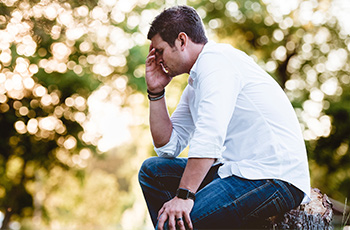
Trouble falling asleep or staying asleep. Too much sleep or too little sleep. It can be a vicious cycle for those with depression. While insomnia or other sleep problems do not cause depression alone, lack of quality shuteye does play a role.
In fact, regardless of the reason, failing to get regular sleep often worsens depression. To shed more light on the connection between depression and sleep, Mikaela Andrea, a Licensed Master Social Worker with Holland Hospital Behavioral Health Services, offers answers to some common questions:
What is depression?
Depression is a mood disorder, not just a temporary case of the blues. According to the World Health Organization (WHO), depression is the most common illness worldwide and the leading cause of disability. Symptoms may include:
- Feelings of helplessness and hopelessness.
- Loss of interest in daily activities, hobbies, pastimes, socializing or sex.
- Appetite or weight changes.
- Sleep problems.
- Anger or irritability.
- Loss of energy.
- Self-loathing.
- Reckless or “escapist” behavior, such as substance abuse, compulsive gambling or reckless driving.
- Concentration problems.
- Unexplained aches and pains.
Why does sleep matter?
Sleep is restorative, increasing energy and productivity, boosting memory, enhancing mood and concentration, and more. Not sleeping enough (a reality for millions of Americans) can have serious consequences beyond negatively impacting quality of life, including obesity, heart disease, cancer and even death.
While the relationship between sleep and depression is complicated, doing all you can to regulate and improve your z’s stands to only benefit your health, physically and mentally.
How are sleep problems and depression treated?
Depending on your symptoms and health, treating depression may involve behavioral counseling, medications, and/or making key lifestyle changes. Medications are commonly prescribed to help reduce symptoms of depression, including problems with falling and staying asleep. Many people start by speaking with their primary care doctors.
What else can you do to sleep well?
Here are seven tips to better sleep:
- Develop a pre-sleep ritual (e.g., reading, meditating or taking a warm bath).
- Limit caffeine and alcohol, especially during the evening. If you smoke, it’s also important to recognize that a cigarette before bed puts nicotine (a stimulant) into your bloodstream.
- Exercise regularly. If you’re someone who becomes more alert after exercise, try to work out earlier in the day.
- Practice relaxation techniques, such as yoga, mindfulness or deep breathing to quell racing thoughts or worry.
- Get out of bed if you can’t sleep versus tossing and turning. Do something relaxing (e.g., listening to soft music), and then return to bed when drowsy.
- Create an ideal sleep environment; e.g., wear earplugs, keep your bedroom cool and dark, use a fan or white noise.
- Turn off phones, tablets and other electronic devices an hour before bedtime.
If you’re struggling with depression, don’t go it alone. Hope and healing are possible with professional guidance and support.